INDUSTRIEFISCHEREI 15 - NATUR 13
24.05.2023
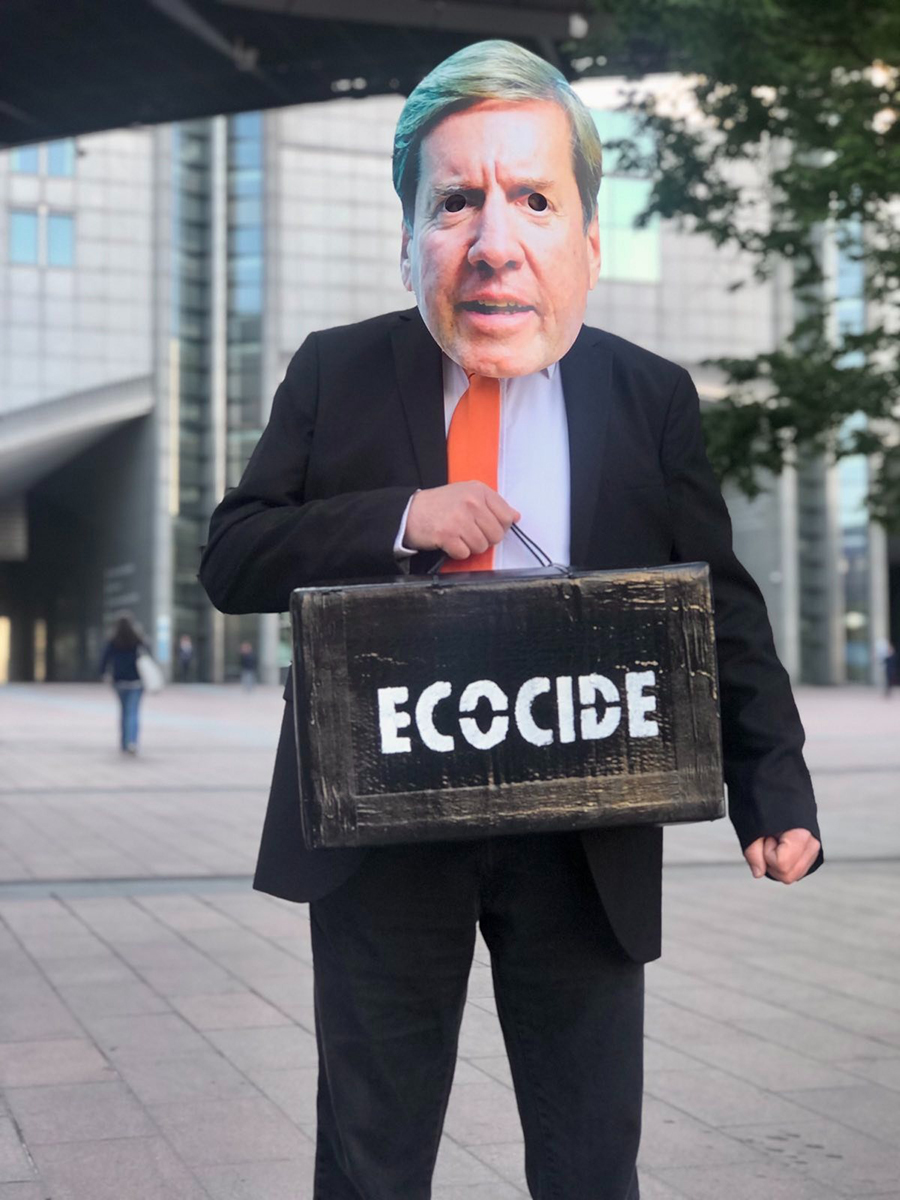
Mittwoch, 24. Mai, 19.30 Uhr, drei verdächtige Personen wurden auf dem Pl. Vor der entscheidenden Abstimmung über das Gesetz zur Wiederherstellung der Natur im EU-Parlament.
Die drei Personen waren Europaabgeordnete Gabriel Mato Adrover (ES), Bert-Jan Ruissen (NL) und Jan Huitema (NL), alle Mitglieder des PECH-Ausschusses. Zwei des Trios trugen eine Aktentasche von ECOCIDE, ein anderer eine Aktentasche mit dem neuen NATURWIEDERHERSTELLUNGSGESETZ.
Die Europaabgeordneten waren auf dem Weg von einem Treffen mit Lobbyisten zur Sitzung des PECH-Ausschusses und wollten die Industriefischerei weiterhin unterstützen, indem sie gegen die neue Richtlinie stimmten. Gesetz zur Wiederherstellung der Natur (NRL) im EU-Parlament.
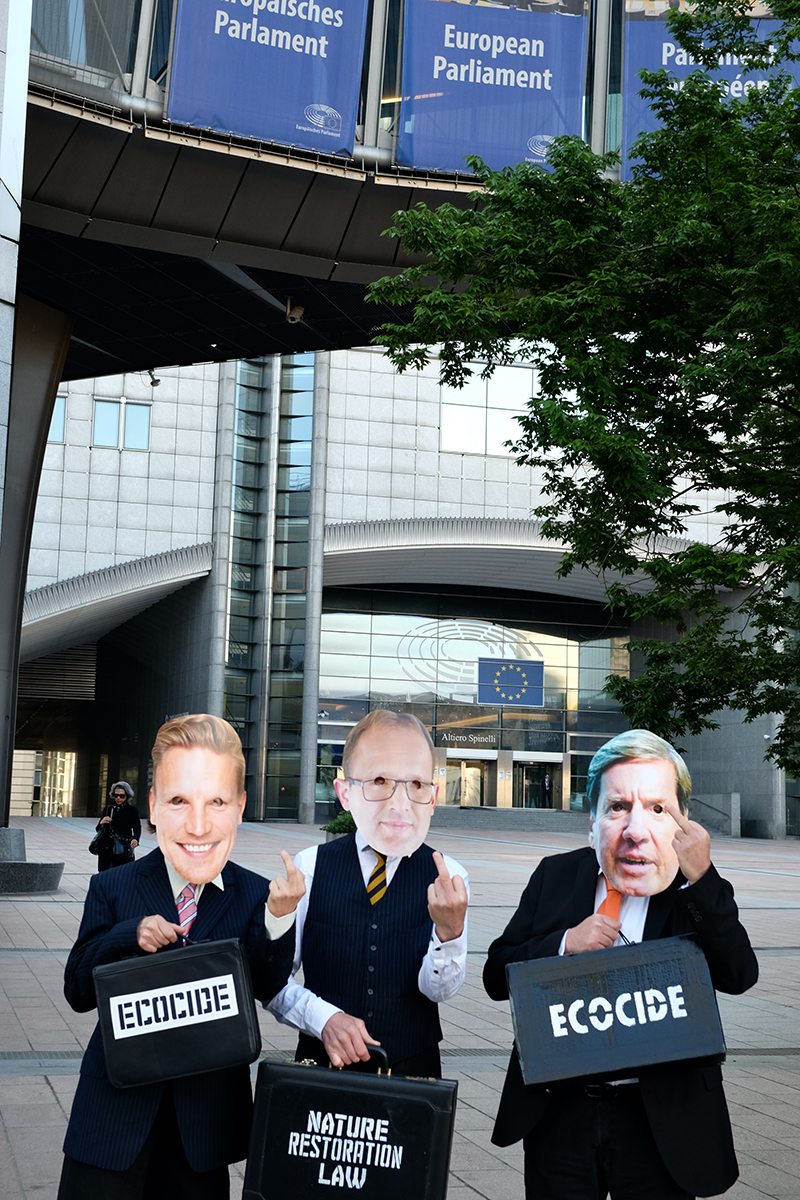
Wie vorhergesagt, haben unsere drei Liebhaber der Industriefischerei der Natur und dem Ozean den Mittelfinger gezeigt. Ihre Verachtung für ehrgeizige neue Denkansätze und ihr Wunsch nach "Business-as-usual" wird nur noch übertroffen von ihrer Verachtung für ihre die Sorge der Bürger um die Umwelt.
Natürlich stimmte der EU-Fischereiausschuss mit 15 zu 13 Stimmen gegen das Gesetz zur Wiederherstellung der Natur, trotz verzweifelter Versuche anderer Europaabgeordneter, im Namen der lokalen Kleinfischer zu intervenieren.
Das Schicksal des Ozeans hängt von uns allen ab.
Unsere Interventionen sind auf Ihre Unterstützung angewiesen.
Was ist das Gesetz zur Wiederherstellung der Natur?
Im Juni letzten Jahres legte die Europäische Kommission das neue Gesetz zur Wiederherstellung der Natur vor, mit dem erstmals rechtsverbindliche Ziele für die Wiederherstellung geschädigter Ökosysteme und die Umkehrung des Verlusts der biologischen Vielfalt eingeführt werden. Das neue Gesetz gibt allen Mitgliedstaaten das Ziel vor, bis 2030 20% der Flächen und Meere in der EU wiederherzustellen.
Leider können die in der NRL enthaltenen Erhaltungsmaßnahmen beim derzeitigen Stand der Dinge von Mitgliedstaaten blockiert werden, die die industrielle Fischerei und den Krieg gegen den Fisch fortsetzen wollen. Das liegt daran, dass die NRL immer noch das dysfunktionale Rechtsverfahren der Gemeinsamen Fischereipolitik (GFP) nutzt. Wenn dies geschieht, ist die NRL kein Gesetz, sondern wird zur "Nature Restoration Fishing Option" (Option zur Wiederherstellung der Natur) - Sie haben die Wahl, ob Sie mitmachen oder nicht. Und wir wissen, wohin das führen wird - die EU-Regierungen werden aussteigen und leichte wirtschaftliche Gewinne aus der GFP den schwierigeren Entscheidungen vorziehen, die erforderlich sind, um das Leben im Ozean zu retten und eine bessere Zukunft für die Küstengemeinden zu schaffen.
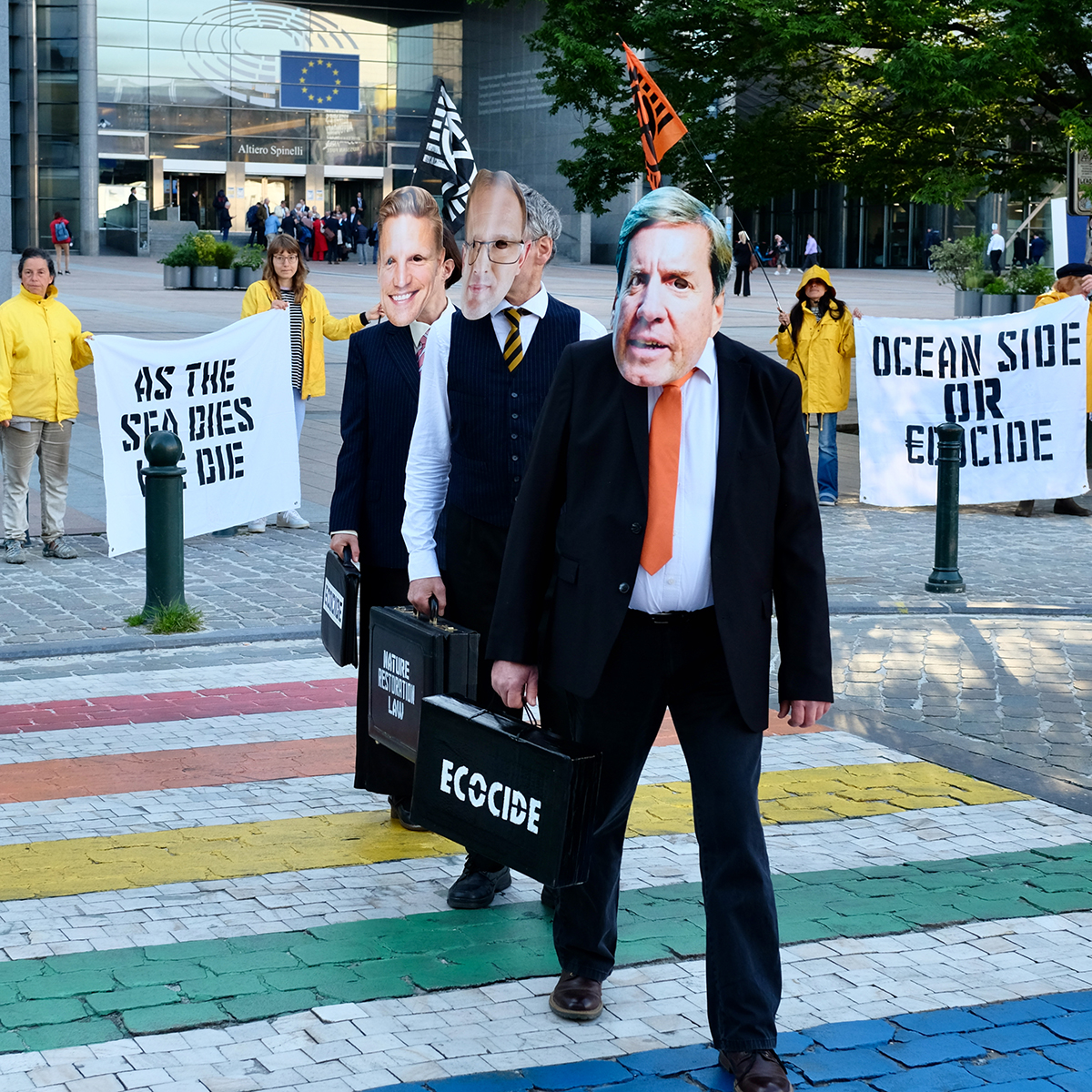
Heute war ein sehr guter Tag im Büro für unsere drei Amigos, Jan, Bert und Gabby.
Theoretisch können wir als Mitglieder der PECH-AusschussIhre Aufgabe ist es, sich um die Fische in der EU zu kümmern, indem sie dafür sorgen, dass die GFP-Instrumente, die für die Bewältigung der Herausforderungen in den Bereichen Klima und biologische Vielfalt erforderlich sind, umgesetzt werden. Aber es scheint, dass PECH die Fische nicht mag. Er bezeichnet sie als "Fischbestände". Und wenn Wissenschaftler PECH warnen, dass Die Fischbestände" brechen zusammen Die PECH holt sich alternativen Rat bei den Lobbyisten der Industriefischerei, die ihr sagen, dass alles in Ordnung ist.
Der Vorsitzende des PECH-Ausschusses ist Pierre Karleskind (FR).
Wir fordern Pierre auf, als Vorsitzender den PECH-Ausschuss zu einem neuen Aufbruch in eine verantwortungsvolle Fischereipolitik zu führen. Pierre muss aufhören, auf EVP-Kollegen zu hören, wie Gabbydie nur daran interessiert sind, Argumente über lokale Arbeitsplätze und Lebensmittelsicherheit zu spinnen (während sie in Wirklichkeit große Unternehmen unterstützen).
Es ist an der Zeit, dass die PECH kreativ über die Sorgen um die Arbeitsplätze in der Fischerei nachdenkt - das Gesetz zur Wiederherstellung der Natur (NRL) könnte das beste Instrument dafür sein. Es bietet die Chance, die Fischereigemeinden ganz oben auf die Tagesordnung zu setzen, indem es sie mit einem sinnvollen Gesetz (NRL) verknüpft. Was wäre, wenn die Fischereigemeinden an der Küste Testgebiete wären für Grundeinkommen? Und dieses Grundeinkommen ist die Chance für die Einheimischen, sich um ihre lokale Umwelt zu kümmern, sich um den Ort zu kümmern, an dem sie leben?
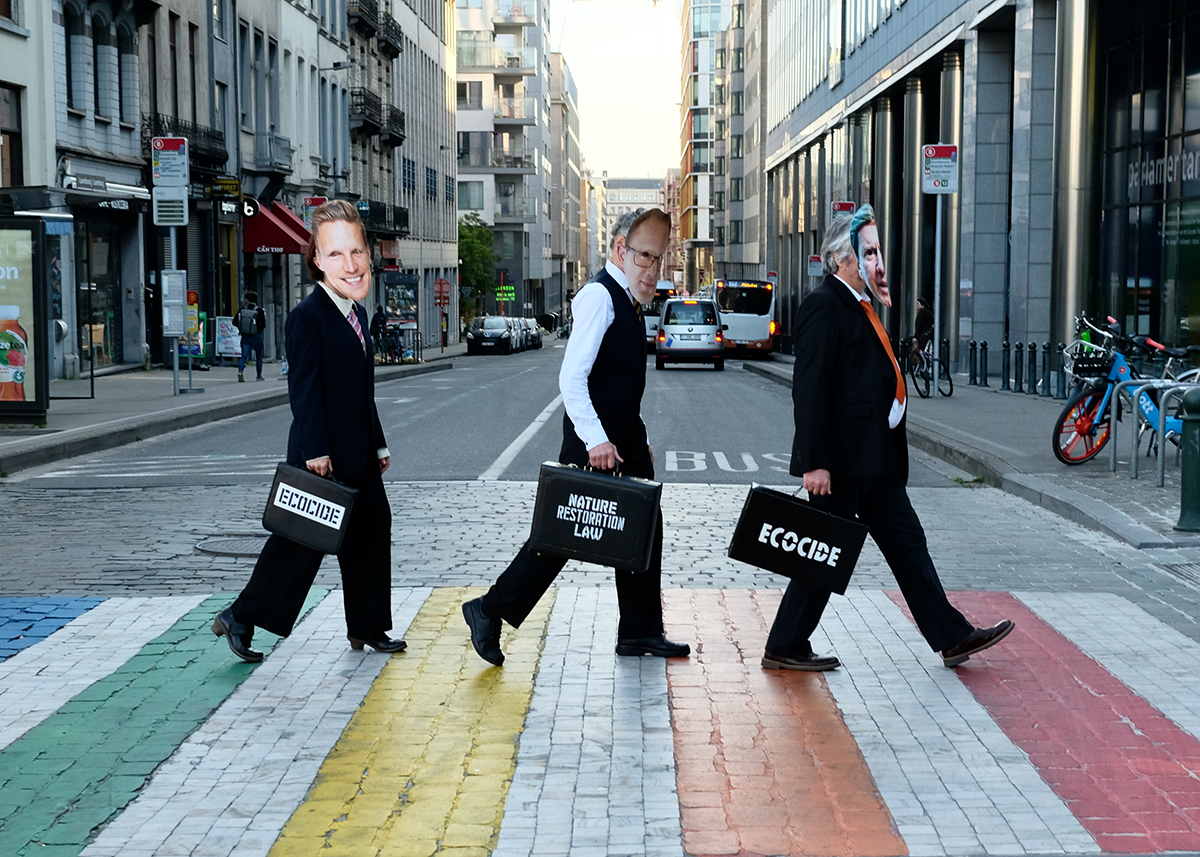
Wie die Beatles muss der PECH-Ausschuss den Weg verlassen und sich von seinen bisherigen Bemühungen abwenden. Der Ozean kann das von der industriellen Fischerei geforderte Fischereiaufkommen nicht verkraften - so etwas wie eine nachhaltige industrielle Fischerei gibt es nicht. Wenn wir so weitermachen wie bisher, wird es keinen Fisch mehr im Meer geben.
Ocean Rebellion fordert das EU-Parlament und den Rat auf, das NATURWIEDERHERSTELLUNGSGESETZ in vollem Umfang zu unterstützen, einschließlich des Vorschlags, die Mitgliedstaaten rechtlich für die Wiederherstellung der Natur verantwortlich zu machen und den EU-Bürgern das Recht einzuräumen, die Mitgliedstaaten bei Nichteinhaltung zu verklagen.
Ocean Rebellion fordert außerdem, dass das EU-Parlament die Fischerei als einen der Hauptverursacher der Meereszerstörung in die NRL aufnimmt und dies durch ein Verbot der Grundschleppnetzfischerei in allen EU-Gewässern unterstreicht. Außerdem muss es sich verpflichten, die Fischerei um 80% zu reduzieren, was durch die Beendigung der industriellen Fischerei und die Stärkung der Küstengemeinden durch die Förderung einer schonenden, arbeitsintensiven traditionellen Fischerei und durch Anreize für die Meerespflege erreicht werden soll.
Die EU-Mitgliedstaaten müssen den Mut aufbringen, den reichen Lobbyisten die Stirn zu bieten, nachhaltige Arbeitsplätze zu schaffen und das sterbende Meer zu sanieren.
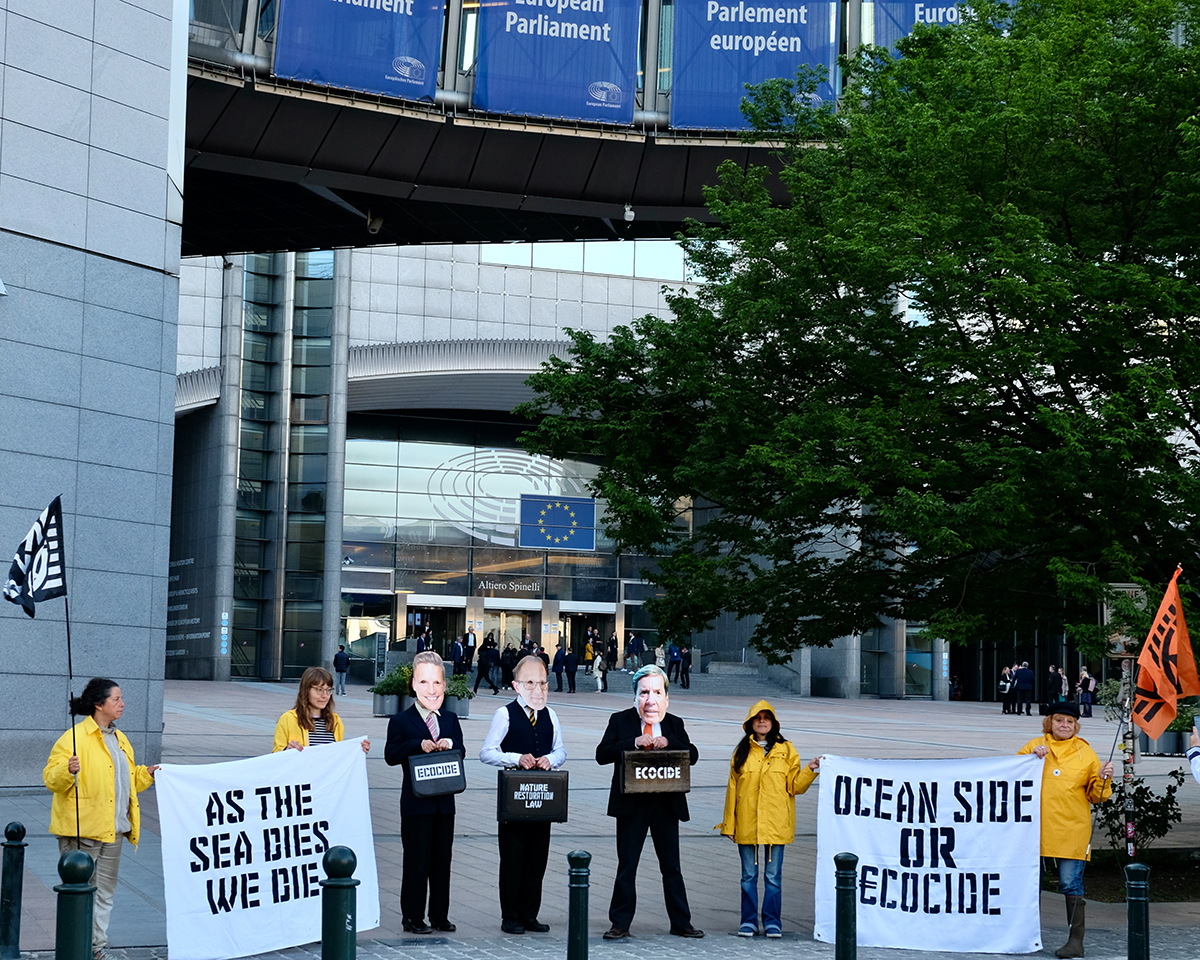
ZITATE
sagt Suzanne Stallard von Ocean Rebellion:
"Das Gesetz zur Wiederherstellung der Natur muss Maßnahmen zur Fischerei beinhalten. Die industrielle Fischerei zerstört das Leben im Meer und die Lebensräume, das muss jetzt aufhören. Das Gerede von Gabriel Mato, den Umweltschutz zugunsten sozioökonomischer Erwägungen und der Ernährungssicherheit zu ignorieren, ist nur ein Taschenspielertrick - so weiterzumachen wie bisher ist keine Option. Beide Probleme lassen sich am besten lösen, wenn wir das Gesetz zur Wiederherstellung der Natur nutzen, um die Art und Weise, wie wir miteinander und mit unserer Umwelt leben, grundlegend zu ändern. "
Sophie Miller fügt hinzu:
"Dies ist eine Chance für die EU, der Welt zu zeigen, wie ein sinnvoller Wandel aussehen kann. Aber das Gesetz zur Wiederherstellung der Natur geht nicht weit genug. Wir brauchen eine 80%-Wiederherstellung und nur eine vorsichtige Gewinnung durch Menschen vor Ort, die ihre Umwelt verstehen."
Stefanie Wels fügt hinzu:
"Wir haben fast alle wilden Proteine auf dem Land aufgefressen und sind nun auf dem besten Weg, das Gleiche mit den Ozeanen zu tun. Das bedeutet, dass wir sie leer und dezimiert von den Fischen zurücklassen werden, die einst frei schwammen. Wir müssen die Fische schützen, wir müssen die Grundschleppnetzfischerei und die industrielle Fischerei jetzt beenden, um den Fischpopulationen eine Chance zur Erholung zu geben. Aufgrund des von den Meeresorganismen gespeicherten Kohlenstoffs sind der Zusammenbruch der biologischen Vielfalt im Meer und der Klimanotstand mehr oder weniger dasselbe. Wir können das eine nicht ohne das andere lösen, und wenn wir die Ozeane ausrotten, haben wir keine realistische Chance mehr, das Klima und unsere Gesellschaft zu retten."
Clive Russell, ebenfalls von Ocean Rebellion, fügt hinzu:
"Die Menschheit hat dem Fisch den Krieg erklärt, und wir gewinnen. Der Ozean ist so dezimiert, dass kleine Fischergemeinden am Rande des Überlebens stehen und Gebiete, die früher reichlich vorhanden waren, jetzt leer sind. Mehr als 100 Millionen Menschen sind für ihre tägliche Ernährung und ihren Lebensunterhalt auf die Küstenfischerei und die kleine handwerkliche Fischerei angewiesen - oft in denselben Gewässern, die von Grundschleppnetzfischern befischt werden. Wir müssen die Fischerei um 80% reduzieren, indem wir die industrielle Fischerei stoppen. Klimazerstörung und Naturzerstörung sind im Grunde dasselbe, und beides muss jetzt gestoppt werden."
Das Schicksal des Ozeans hängt von uns allen ab.
Wir lassen Sie wissen, was wir tun, um zu helfen.
Fotos: Stéphane Lagasse